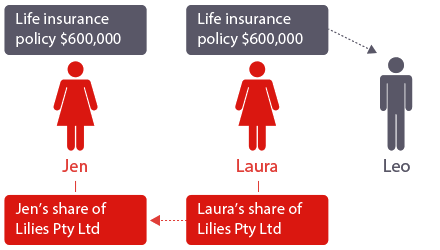Protection for transfers of ownership


You may share the ownership of your business with one or more people – if you do, it may be important to consider what would happen to the ownership of the business if one of the owners died or had to exit.
Business owners will sometimes establish a legal agreement, such as a Buy-Sell agreement in order to provide more certainty if this happens.1
A Buy-Sell agreement is a document which commonly sets out the wishes of the business owners should one of them die, become incapacitated or trigger any one of a range of specified events. It can be drafted in a number of ways to suit your circumstances, and those of your business. For example, if your business partner dies, a Buy-Sell agreement can be structured to give you the legal right to buy their share of the business, for a specified amount. The agreement could also give you (or your beneficiaries) the right to sell your share of the business to the other business owner(s), should one of these events happen to you. The purchase can be funded by life insurance policies, taken out on the lives of each owner.
A Buy-Sell agreement, coupled with an insurance policy, can be useful for a number of reasons:
Jen and Laura are co-owners of Lilies, a thriving florist business. They have been operating the business for a number of years and work very well together, each complimenting the other’s unique talents. If either of them were to die or become disabled, they would like to have the option of purchasing the other’s share of the business, however neither would be able to afford to do this at short notice.
Whilst Jen is single and has no dependants, Laura has a husband, Leo and two children. If Laura died, all of her assets would pass to Leo under her will, including her share of Lilies. Jen is deeply concerned about this. Leo works as an IT consultant and has no experience in running a business, let alone a florist. In addition, Jen and Leo have very different personality types and do not have a great deal in common.
First, their financial adviser arranges for the business to be valued by an independent valuer – and a business value of $1.2 million is established – Laura and Jen each own 50%. Next, their financial planner recommends that Laura and Jen each establish a life and TPD insurance policy of $600,000 – this is to ensure that each will have enough money to purchase the other’s share of the business. Finally, their lawyer drafts a Buy-Sell agreement, giving both Jen and Laura the right to purchase the other’s share of Lilies should a ‘trigger’ event, such as death or disability occur.
The diagram below illustrates what happens under this particular Buy-Sell agreement if Laura dies or becomes permanently disabled.

The Buy-Sell agreement will give Jen the right to acquire Laura’s share of Lilies. The purchase by Jen, of Laura’s share of the business is funded by the proceeds from Laura’s insurance policy.
Outcome: In the event that Laura dies, Jen would acquire full ownership of the business, avoiding a potentially disastrous business relationship with Leo.
Note: It is important to understand all of the implications of entering into a Buy-Sell agreement, including that the agreement may compel you, or your estate, to sell your share of the business. You should always seek professional legal and tax advice.
1. Other legal agreements, such as a Partnership Agreement may also deal with a transfer of business equity on the departure of a business owner.
2. For illustrative purposes only. The above case study demonstrates how BT Protection Plans may be able to aid you in times of need. Your financial planner will be able to assist you in determining the appropriate cover for your business.
A target market determination has been made for Protection Plans products. Please visit westpac.com.au/tmd for any of our target market determinations.
The Insurer and Issuer is Westpac Life Insurance Services Limited ABN 31 003 149 157 AFSL 233728, except for Term Life as Superannuation, Income Protection as Superannuation and Income Protection Assured as Superannuation, issued by BT Funds Management Limited ABN 63 002 916 458 AFSL 233724 as Trustee of Retirement Wrap ABN 39 827 542 991. They are subsidiaries of Westpac Banking Corporation ABN 33 007 457 141 AFSL 233714, who does not guarantee the insurance.
This information does not take into account your personal circumstances. Terms and conditions, and limitations and exclusions apply. Read the BT Protection Plans Disclosure Statement (PDS) to see if this insurance is right for you.